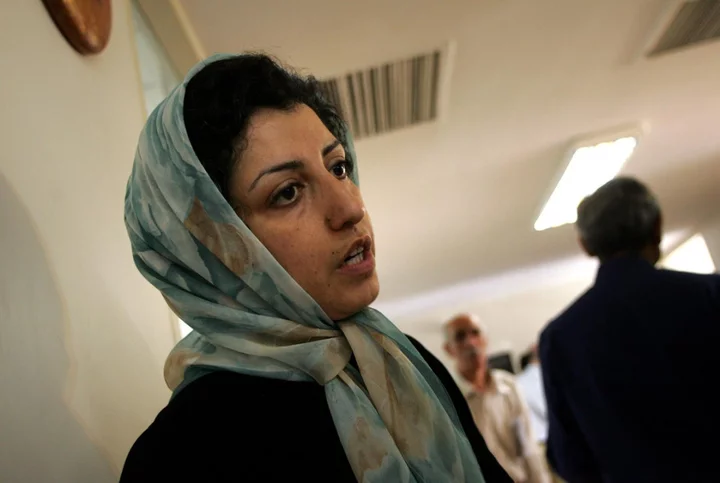
Nobel Peace Prize awarded to jailed Iranian women’s rights ‘freedom fighter’ Narges Mohammadi
The Nobel Peace Prize has been to imprisoned activist Narges Mohammadi for fighting oppression of women in Iran and broader human rights and freedom for all. The Nobel committee's decision to award the prize to Mohammadi comes after more than a year of protests in Iran spearheaded by women. They were sparked in September 2022 after Mahsa Amini, a 22-year-old, died in the custody of Iran's morality police. The unrest rapidly spread across the country, with demands ranging from more freedoms to an overthrow of the state. “She fights for women against systematic discrimination and oppression,” the head of the Norwegian Nobel Committee, Berit Reiss-Andersen, said in announcing the prize in Oslo. Ms Reiss-Andersen said that Mohammadi supports the struggle for women to live "full and dignified lives". Hailing Mohammadi as a "freedom fighter", Ms Reiss-Andersen said, started her speech by saying, in Farsi, the words for "woman, life, freedom" - one of the slogans of the protests. Images of Iranian women defiantly setting their headscarves on fire and chanting the phrase spread around the world. Mohammadi was behind bars as the protests grew nationwide, sparking one of the most-intense challenges ever to Iran's theocracy since its 1979 Islamic Revolution. More than 500 people were killed in a heavy security crackdown while more than 22,000 others have been arrested. In piece for The New York Times from behind bars, Mohammadi wrote: "What the government may not understand is that the more of us they lock up, the stronger we become". Ms Reiss-Andersen said the peace prize award also recognised the hundreds of thousands of people who have demonstrated against Iranian discrimination and oppression of women. "This prize is first and foremost a recognition of the very important work of a whole movement in Iran, with its undisputed leader, Narges Mohammadi," she said. "Only by embracing equal rights for all can the world achieve the fraternity between nations that [prize founder] Alfred Nobel sought to promote," she said. Authorities arrested Mohammadi in November after she attended a memorial for a victim of 2019 protests that started over a rise in fuel prices but morphed into a broader show of dissent that was crushed by security forces in another bloody crackdown. Mohammadi is currently serving multiple sentences in Tehran's Evin Prison amounting to about 12 years imprisonment, according to the Front Line Defenders rights organisation. Charges against her – which the international community have decried – include spreading propaganda against the state. Mohammadi has a long history of imprisonment, harsh sentences and international calls for reviews of her case. "If the Iranian authorities make the right decision, they will release her so that she can be present to receive this honour, which is what we primarily hope for," Ms Reiss-Andersen said. The Office of the United Nations High Commissioner for Human Rights (OHCHR) said he award highlights the courage of Mohammadi and women like her. "We've seen their courage and determination in the face of reprisals, intimidation, violence and detention," spokesperson Elizabeth Throssell said. "[Women] been harassed for what they do or don't wear. There are increasingly stringent legal, social and economic measures against them. This really is something that highlights the courage and determination of the women of Iran and how they are an inspiration to the world." Mohammedi is the 19th woman to win the Nobel Peace Prize and the second Iranian woman, after human rights activist Shirin Ebadi won the award in 2003. Before being jailed, Mohammadi was vice president of the banned Defenders of Human Rights Center in Iran. Ebadi founded the centre. Ebadi left Iran after the disputed re-election of then-President Mahmoud Ahmadinejad in 2009 that touched off unprecedented protests and harsh crackdowns by authorities. In 2018, Mohammadi, an engineer, was awarded the 2018 Andrei Sakharov Prize. According to the will of Alfred Nobel, the prize should be awarded to the person "who has done the most or best to advance fellowship among nations, the abolition or reduction of standing armies, and the establishment and promotion of peace congresses". Previous winners of the prize – which can be awarded to individuals or organisations – include Nelson Mandela, Barack Obama, Mikhail Gorbachev, Aung San Suu Kyi and the United Nations. In recent years there has been a broad interpretation of that declaration in Nobel’s will. Last year’s prize was won by human rights activists from Ukraine, Belarus and Russia, in what was seen as a strong rebuke to Russian President Vladimir Putin in the wake of his invasion of Ukraine, which used Belarus as a staging post. Unlike the other Nobel prizes that are selected and announced in Stockholm, Nobel decreed that the peace prize be decided and awarded in Oslo by the five-member Norwegian Nobel Committee. The independent panel is appointed by the Norwegian parliament. This year, the committee received 351 nominations — 259 for individuals and 92 for organisations. People who can make nominations include former Nobel Peace Prize winners, members of the committee, heads of states, members of parliaments and professors of political science, history and international law. The prizes are handed out at awards ceremonies in December in Oslo and Stockholm. They carry a cash award of 11 million Swedish kronor (about £820,000). Winners also receive an 18-carat gold medal and diploma. Read More Moment Nobel Peace Prize awarded to jailed Iranian campaigner Narges Mohammadi Russian missile attack kills 52 as Putin delivers rambling speech Ukraine says gains made in intense fighting in east despite Russia’s aerial dominance Russian missile attack kills 52 as Putin delivers rambling speech Ukraine says gains made in intense fighting in east despite Russia’s aerial dominance Putin says plane of Wagner chief Prigozhin blown up by hand grenades on board
2023-10-06 17:58
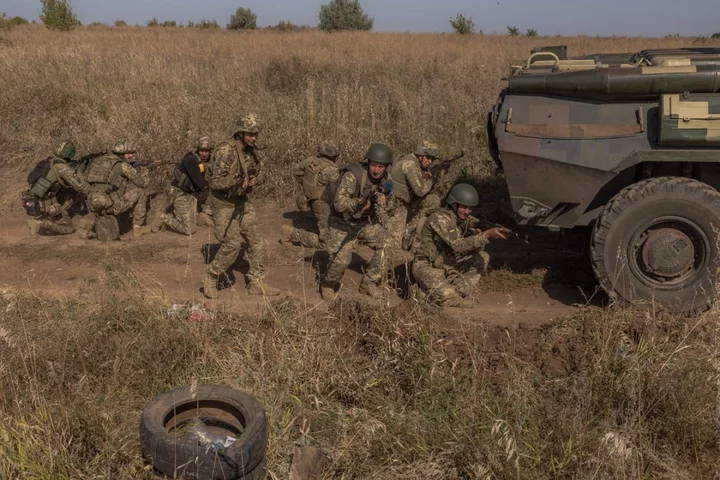
Ukraine says gains made amid intense fighting in east despite Russia’s aerial dominance
Ukrainian forces have advanced in the eastern part of the war-hit nation where officials said Vladimir Putin has deployed over 110,000 troops, but Kyiv officials reported pressure further north. The intensity of assaults have increased in the Lyman-Kupiansk sector, Ilia Yevlash, spokesperson for Ukraine’s eastern group of forces, said. Mr Yevlash called the two towns the “most difficult area” as Russian forces use both ground and air forces. Russian forces are actively using fighter jets, Su-35 and Su-25, and helicopters Ka-52 and Mi-8 in the region, he said. They were backed by Su-35 attack aircraft and started attacking along the frontline in the direction of Makiivka in the Luhansk region. Lyman and Kupiansk towns in Kharkiv oblast were recaptured by Ukrainian troops late last year and have witnessed continuous Russian assaults since then. “The enemy has chosen a new point – Makiivka – and is directing all its main efforts into this direction. Of course, we are also repulsing enemy attacks and inflicting damage on forces and equipment," Mr Yevlash said in a daily update. Kyiv’s battle to regain ground near the ghost city of Bakhmut, which has been reduced to rubble in a warfare lasting over a year, is also continuing in the eastern theatre. Two main theatres of war – in southern Ukraine and eastern Ukraine – have cropped up during Kyiv’s four-month old counteroffensive to push back Russian forces off its soil. In its evening report, the general staff of Ukraine’s Armed Forces claimed Kyiv’s troops had "achieved success" south of Andriivka. The village south of Bakhmut was captured by Ukrainian troops last month in the Donetsk region. The Ukrainian general staff said its forces were pressing on with their southward advance in the Zaporizhzhia region and had repelled a Russian attack near the village of Robotyne. The report said Russian forces had unsuccessfully tried to regain lost positions in an area further south. This was further corroborated by Russian accounts of the fighting which said Moscow’s forces had repelled two Ukrainian attacks west of the Russian-held city of Donetsk. In the southern theatre, Kyiv’s forces are pushing toward the Sea of Azov in an attempt to split Russian-occupied territory in two. Read More Ukraine-Russia war – live: Deadly Russian attack on memorial service was no blind strike, says Zelensky Putin says Wagner chief Prigozhin’s plane blown up by hand grenades on board Putin deliberately attacked Ukrainian civilians in Kharkiv missile strike, says Zelensky A look at Russia's deadliest missile attacks on Ukraine White House condemns ‘horrifying’ Russian attack on grocery store in Ukraine
2023-10-06 15:19
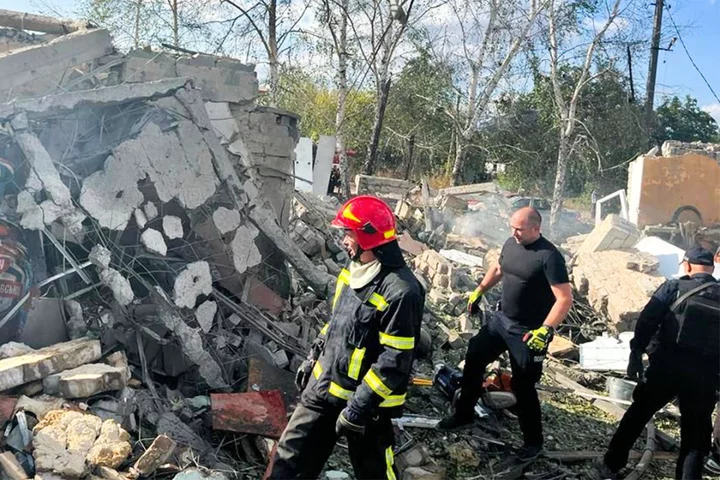
Ukraine-Russia war – live: Hroza Iskander missile attack kills 51 as Putin delivers rambling speech
A Russian missile attack has killed 51 people at a memorial service, including a six-year-old boy, in what Ukraine’s president Volodymyr Zelensky has called “no blind strike”. The Russian missile slammed into a cafe and shop in a village in northeastern Ukraine on Thursday, killing 51 people in Hroza village in the eastern Kharkiv region. The attack – thought to have been carried out using an Iskander ballistic missile – appears to have caused one of the biggest civilian death tolls in any single Russian strike. Mr Zelensky, who was attending a summit with European leaders, said: “Russian troops could not have been unaware of where they were hitting. This was no blind strike.” "The terrorists deliberately carried out the attack during lunchtime, to ensure a maximum number of casualties," said Defence Minister Rustem Umerov. "There were no military targets there. This is a heinous crime intended to scare Ukrainians." Meanwhile, Russian President Vladimir Putin on Thursday evening called the Canadian parliament's standing ovations to honour a Ukrainian war veteran who served in Nazi Waffen SS units "disgusting", and said it showed Moscow was right to "denazify" Ukraine. Canadian Prime Minister Justin Trudeau last month formally apologised after the speaker of the Canadian House of Commons, Anthony Rota, praised 98-year-old ex-soldier Yaroslav Hunka in the chamber while Ukrainian President Volodymyr Zelenskiy was present. Rota said he had made a mistake and resigned. "He essentially lumped together Nazi collaborators, SS troops and the Ukrainian military of today who are fighting against Russia," Putin told an audience at the Valdai Discussion Club in Sochi in response to a question. "This only confirms our thesis that one of our goals in Ukraine is denazification." Read More Russian missile strike kills more than 50 Ukrainians gathered for wake – in deadliest such attack in months Former Russian state TV journalist gets 8 1/2-year sentence in absentia for Ukraine war criticism Russia facing ‘functional defeat’ in the Black Sea – but Kyiv allies warn they are running out of ammunition Russia may attack civilian ships with sea mines and blame Ukraine, UK warns
2023-10-06 15:18
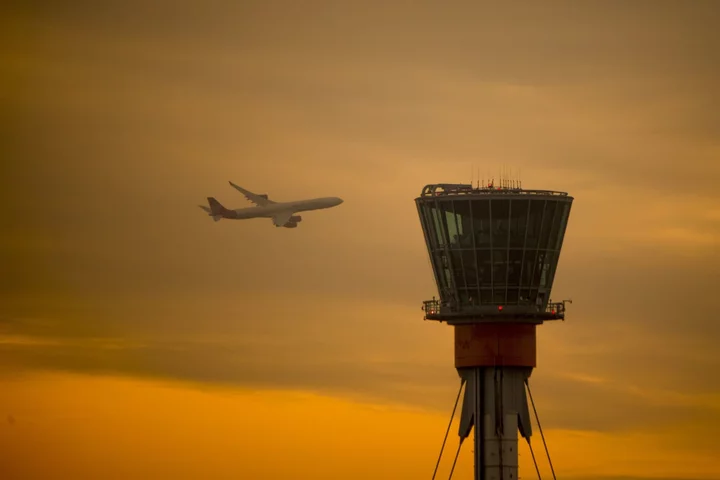
UK Names Head to Review Cause of Summer Air-Traffic Outage
The UK’s aviation regulator has appointed a chairman to lead a review into the air-traffic system outage that
2023-10-06 14:59
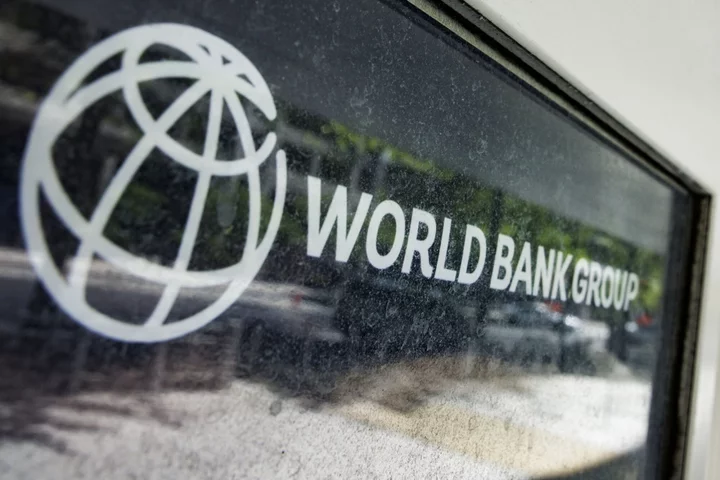
World Bank Says Saudi Economy to Shrink on Lower Oil Output
Saudi Arabia’s economic output is expected to contract this year as a series of oil-supply cuts pose a
2023-10-06 14:50

Vietnam Says TikTok’s Content Censorship Isn’t Effective
Vietnam’s communications ministry accused TikTok Inc. of failing to effectively block content that violates the law after the
2023-10-06 14:47
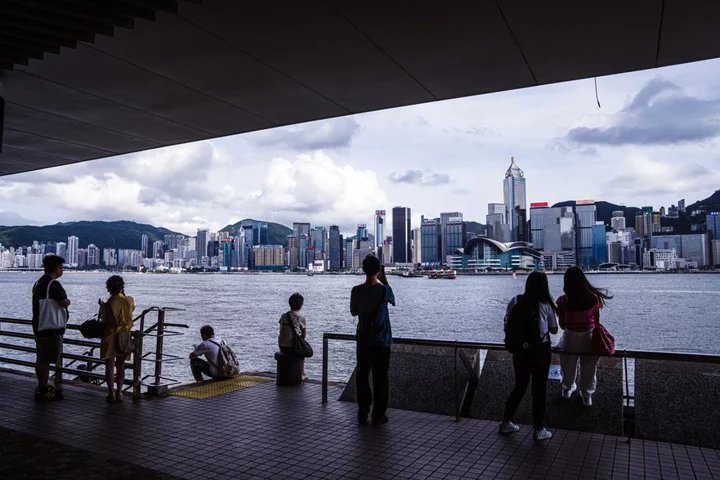
Hong Kong Wealth Firms’ Gloom Spreads With Drop in Assets
Hong Kong’s private wealth managers are growing more pessimistic after a sharp drop in assets under management as
2023-10-06 14:46
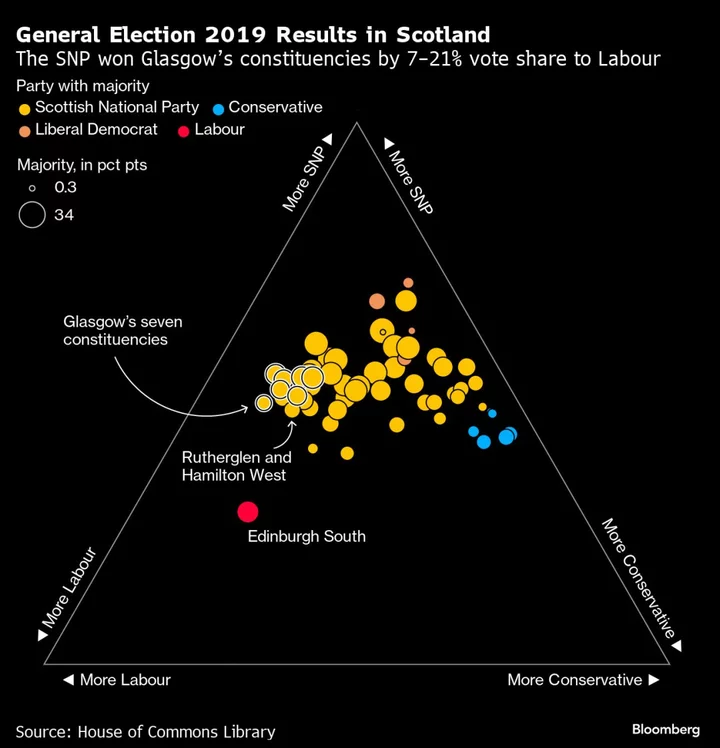
Labour Win in Scotland Seat Bolsters Leader Keir Starmer
The Labour Party won a parliamentary special election in Scotland on a large swing, suggesting leader Keir Starmer
2023-10-06 14:45
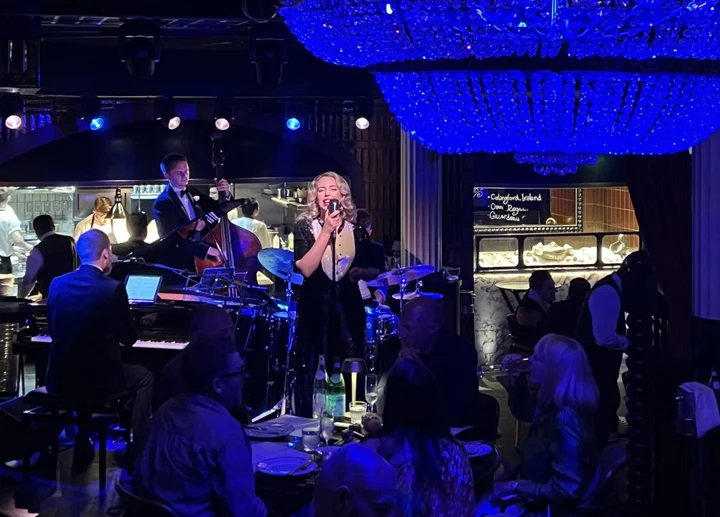
Dubai's Hottest Restaurants Are Infiltrating Cities Worldwide
Dubai used to be a place where the best restaurants had been imported from other parts of the
2023-10-06 14:26
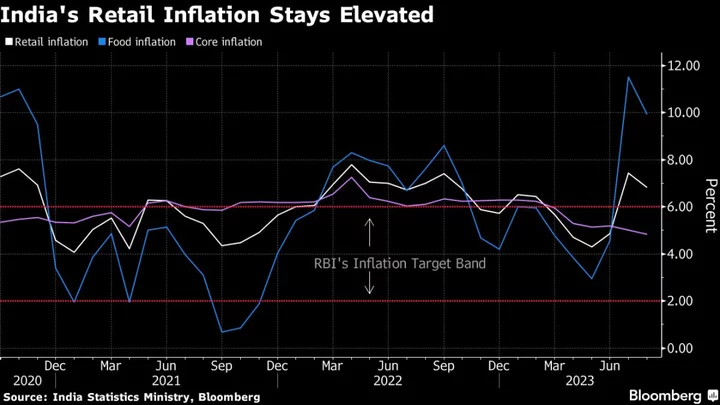
RBI Says Inflation Still ‘Major Risk’ as It Holds Rates
The Reserve Bank of India left its key interest rate unchanged Friday, saying inflation remains a major risk
2023-10-06 13:59
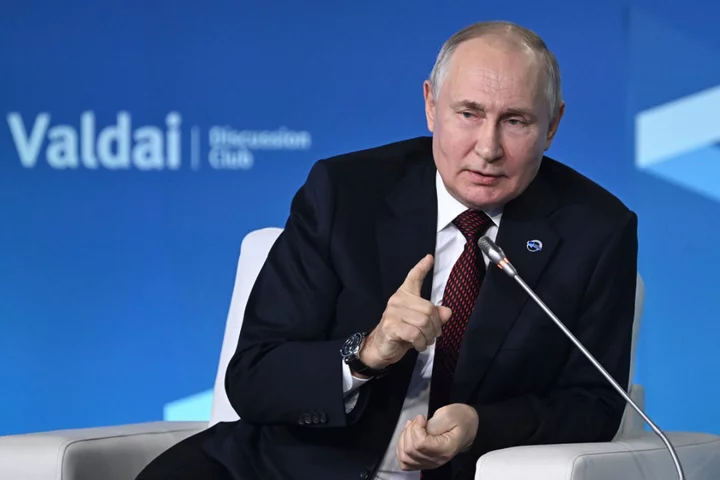
Putin says Wagner chief Prigozhin’s plane blown up by hand grenades on board
Russian president Vladimir Putin said the plane carrying Wagner mercenary chief Yevgeny Prigozhin was blown up from the inside and fragments of hand grenades have been found in the bodies of those killed in the crash. This is the first time Mr Putin commented on the details of the plane crash that killed Prigozhin – the mercenary leader who had challenged his regime and launched a military coup by marching onto Moscow in a dramatic threat to the Kremlin not seen in decades. "Fragments of hand grenades were found in the bodies of those killed in the crash," Mr Putin told a meeting of the Valdai Discussion Club in the Black Sea resort of Sochi, but did not share any details on the type and number of hand grenades that could have been detonated on board. He denied an external influence or targeting of the plane from the outside. "There was no external impact on the plane – this is already an established fact," he said, rejecting assertions by unidentified US officials who said shortly after the crash that they believed it had been shot down. Mr Putin said the head of Russia’s investigative committee had reported to him a few days ago. The private Embraer jet carrying the Wagner leader and the mercenary group’s co-founder along with eight other people crashed north of Moscow on 23 August. All 10 people onboard were reported dead. Mr Putin also suggested that the remains of the passengers, including Prigozhin, should have been tested for alcohol and drugs. He said he thought investigators were wrong to have not carried out these tests on the bodies of those killed in the crash. "In my opinion, such an examination should have been carried out but it was not," he said. The searches of Wagner’s offices in St Petersburg by the FSB found 10bn roubles ($100m) in cash and 5kg (11 pounds) of cocaine, he said. The investigators of the crash have yet to report publicly on the cause. Neither Wagner nor Prigozhin’s family could be reached to comment on Mr Putin’s remarks. Prigozhin had claimed pride in casting Wagner as the world’s most war-hardened fighting force and was known to have carried out Russia’s dirty work in middle-east and Africa. The mercenary fighters waged a brutal battle – dubbed the “meat grinder” – in Bakhmut last year in winter, where they eventually handed Moscow its biggest territorial gain in many months. Just two months before his death, he had accused Mr Putin’s top military brass, defence minister Sergei Shoigu and general staff Valery Gerasimov of incompetence and warned that Russia could lose the war in Ukraine unless it raised its game. The brief mutiny against Russia’s defence establishment posed the biggest challenge to Putin’s rule since the former KGB spy came to power in 1999. According to the leaders in the West, not only did it expose the strains on Russia of the war in Ukraine, it also showed the worsening relations between the Russian president and his long-time stooge. Read More Putin’s ‘punishment battalions’ full of convicts and drunk recruits: ‘They’re just meat’ Wagner succession: Yevgeny Prigozhin’s son ‘set to be next mercenary boss’ Putin orders former Wagner commander to take charge of 'volunteer units' in Ukraine ‘Weak’ Putin killed Wagner mercenary chief Prigozhin, Zelensky says
2023-10-06 13:47
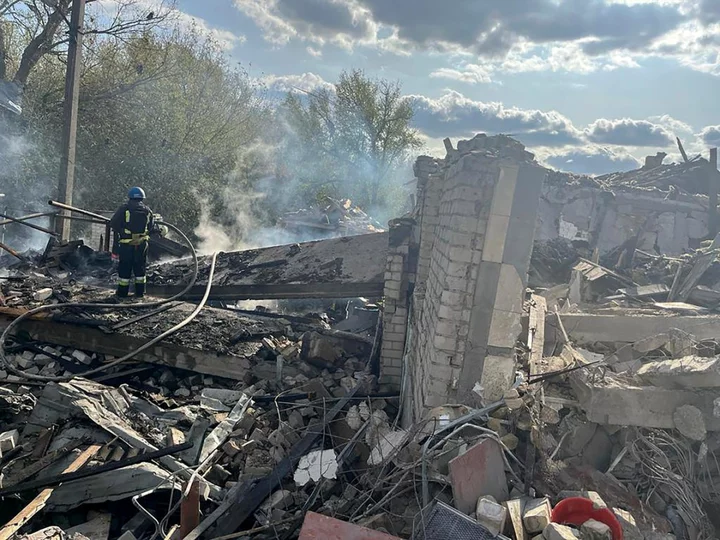
Putin deliberately attacked Ukrainian civilians in Kharkiv missile strike, says Zelensky
Vladimir Putin’s missile attack on a cafe and grocery store in northeastern Ukraine that led to 51 deaths, six injuries and three people left missing was “no blind strike”, said president Volodymyr Zelensky. The strike is the deadliest in the Kharkiv region since Mr Putin’s Ukraine invasion and also among the biggest civilian death tolls in any single Russian missile attack, especially after January this year. The missile strike occurred on Thursday afternoon in Kharkiv’s Hroza village where dozens had gathered to mourn a fallen Ukraine soldier, officials said. “A deliberate missile strike on a village in Kharkiv region on an ordinary store and cafe,” Mr Zelensky said in his nightly video address on Thursday. “Russian troops could not have been unaware of where they were hitting. This was no blind strike,” he said after attending a summit of the European Political Community in Spain. Mr Zelensky said a six-year-old boy was among the dead. According to regional officials, families had remained in the village despite a war-time order to evacuate. The site of the attack showed large piles of bricks, shattered metal and building materials strewn around the cafe and shop struck by a Russian missile. The attack was likely carried out with an Iskander ballistic missile, a Ukrainian minister said, citing preliminary information. Bodies of the dead were laid out in a field next to a children’s playground as rescue workers were seen making their way and sifting through mounds of debris from the attack. Regional police investigator Serhiy Bolvinov said they will use DNA laboratories to identify the bodies as they have found only bits and pieces and remains of the bodies. Officials said the Russian missile hit a service marking a reburial in his home village of a soldier who had died in action elsewhere. The son of the soldier was also killed in the attack, along with his wife and mother, prosecutors told public broadcaster Suspilne. “There were only civilians. The boy was from this village. When he died, we were under occupation. The (family) decided to rebury him, to bring him home,” said resident Oleksandr Mukhovatyi. “Then this happened. Someone betrayed us. The attack was precise, it all landed in the coffee shop.” He said his mother, brother and sister-in-law were among the dead. Local officials were sitting down for a meal when the missile struck, interior minister Ihor Klymenko said. “From every family, from every household, there were people present at this commemoration. This is a terrible tragedy,” he told Ukrainian television. Defence minister Rustem Umerov said the strike was clearly targeted and Ukrainian security services had launched an investigation into the matter. “The terrorists deliberately carried out the attack during lunchtime, to ensure a maximum number of casualties,” he said. “There were no military targets there. This is a heinous crime intended to scare Ukrainians.” Russia has not issued a comment on the attack in Hroza. It has denied deliberately targeting civilians, but many have been killed in attacks that have hit residential areas as well as energy, defence, port, grain and other facilities. Read More Ukraine-Russia war – live: Deadly Russian attack on memorial service was no blind strike, says Zelensky White House condemns ‘horrifying’ Russian attack on grocery store in Ukraine Russian missile strike kills more than 50 Ukrainians gathered for wake – in deadliest such attack in months Nearly 50 European leaders stress support for Ukraine at a summit in Spain. Zelenskyy seeks more aid Russia has tested a nuclear-powered missile and could revoke a global atomic test ban, Putin says
2023-10-06 12:22
